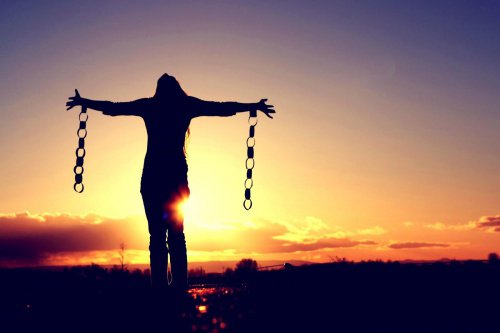Fears Are Hidden in Anger and Rage

Unpleasant emotions, like anger and rage, do exist. However, they mask revealing and important messages. These emotions transmit something very profound about ourselves: the fears that we are unable to recognize and accept.
Why don’t we want to recognize our fears? Our thoughts trap us into a cycle of anger, rage, and unpleasant feelings over and over again. We end up this way because our emotions exist at the mercy of our reasoning.
We live under social pressure. Fears are considered vulnerability, something that makes us weak. We hold this belief without even realizing it, and it causes us to bury our fears in our subconscious. Our deepest fears can be revealed under the guise of anger in certain situations that we are unable to control.
It’s easier to feel angry than to recognize our fears
We are more used to seeing people get mad than we are to seeing people recognize their fears. We insist on this expression through rage, manifesting it even against ourselves (which can produce psychosomatic responses), or externalizing it. When externalized, we project that anger on others based on the belief that a person or situation is what has made us feel so angry.
Processing rage is not easy, although we are more familiar with that emotion than we are with fear. It is experienced on a more superficial level and it is where other issues are buried, issues that we have never addressed, issues we are not prepared to confront.
Undoubtedly, we have all come across people who are always angry. It seems that anger forms an essential part of their character. However, behind that attitude lies many different motives that are maintaining that anger. Rage is only the tip of the iceberg, the part that we can see.
The fears we do not confront become rage, and we can remain in that mental state for a long time if we are not ready deeply investigate its root.

When we repress our anger
When anger becomes present in our lives and we don’t understand why, we begin to think over things that have happened. We intellectualize our emotions and we end up not allowing ourselves to feel our own pain.
We are unable to understand the anger that we feel. We often consider it disproportionate, unjustified, or illogical. We dare to judge what we feel with the ambition to not feel it. We devalue our emotions, and lock them away in the basement of our mind. The truth is, though, that emotions come up for deep and important reasons, and we are canceling out all possibility of understanding and processing those reasons.
Our habitual tendency is to separate our mind from our emotions and allow it to subconsciously pacify what we feel, forgetting about our body and our feelings.
“Sometimes we are too stubborn to admit that we have needs, because in our society, need is equated to weakness. When we keep our anger inside, it often ends up being expressed through other feelings like depression and guilt.”
-Elisabeth Kübler-Ross-

By understanding our fears, we can free ourselves from anger
We have a pretty wide range of fears that have been present in us since childhood, reinforced by society, and deepened by our lack of self-knowledge.
When we are able to take responsibility for our fears, we are in turn able to stop judging ourselves for what we feel and experience. At this point, we no longer feel the need to blame, manipulate, and lie. Upon realizing that we are not responsible for what others feel, we can also see that we are the only ones responsible for what we feel.
In certain moments of anger, there may be a specific, underlying fear. This may be easily recognized by another external person, only when they are trying to see beyond our anger.
Here are a few examples of different types of anger that may be recurring because of a specific fear: anger because someone doesn’t show up or is very late may indicate fear of abandonment. Anger about something that has been said to us that we did not like may indicate fear of not being recognized or not being loved.
Fears are rooted in recurring episodes of anger. When rage keeps appearing in more and more situations, we may find ourselves very angry and believe that it is the fault of others. This impedes our ability to explore our own fears and to take charge of them, depriving us of the opportunity to understand them and heal ourselves once and for all.
Unpleasant emotions, like anger and rage, do exist. However, they mask revealing and important messages. These emotions transmit something very profound about ourselves: the fears that we are unable to recognize and accept.
Why don’t we want to recognize our fears? Our thoughts trap us into a cycle of anger, rage, and unpleasant feelings over and over again. We end up this way because our emotions exist at the mercy of our reasoning.
We live under social pressure. Fears are considered vulnerability, something that makes us weak. We hold this belief without even realizing it, and it causes us to bury our fears in our subconscious. Our deepest fears can be revealed under the guise of anger in certain situations that we are unable to control.
It’s easier to feel angry than to recognize our fears
We are more used to seeing people get mad than we are to seeing people recognize their fears. We insist on this expression through rage, manifesting it even against ourselves (which can produce psychosomatic responses), or externalizing it. When externalized, we project that anger on others based on the belief that a person or situation is what has made us feel so angry.
Processing rage is not easy, although we are more familiar with that emotion than we are with fear. It is experienced on a more superficial level and it is where other issues are buried, issues that we have never addressed, issues we are not prepared to confront.
Undoubtedly, we have all come across people who are always angry. It seems that anger forms an essential part of their character. However, behind that attitude lies many different motives that are maintaining that anger. Rage is only the tip of the iceberg, the part that we can see.
The fears we do not confront become rage, and we can remain in that mental state for a long time if we are not ready deeply investigate its root.

When we repress our anger
When anger becomes present in our lives and we don’t understand why, we begin to think over things that have happened. We intellectualize our emotions and we end up not allowing ourselves to feel our own pain.
We are unable to understand the anger that we feel. We often consider it disproportionate, unjustified, or illogical. We dare to judge what we feel with the ambition to not feel it. We devalue our emotions, and lock them away in the basement of our mind. The truth is, though, that emotions come up for deep and important reasons, and we are canceling out all possibility of understanding and processing those reasons.
Our habitual tendency is to separate our mind from our emotions and allow it to subconsciously pacify what we feel, forgetting about our body and our feelings.
“Sometimes we are too stubborn to admit that we have needs, because in our society, need is equated to weakness. When we keep our anger inside, it often ends up being expressed through other feelings like depression and guilt.”
-Elisabeth Kübler-Ross-

By understanding our fears, we can free ourselves from anger
We have a pretty wide range of fears that have been present in us since childhood, reinforced by society, and deepened by our lack of self-knowledge.
When we are able to take responsibility for our fears, we are in turn able to stop judging ourselves for what we feel and experience. At this point, we no longer feel the need to blame, manipulate, and lie. Upon realizing that we are not responsible for what others feel, we can also see that we are the only ones responsible for what we feel.
In certain moments of anger, there may be a specific, underlying fear. This may be easily recognized by another external person, only when they are trying to see beyond our anger.
Here are a few examples of different types of anger that may be recurring because of a specific fear: anger because someone doesn’t show up or is very late may indicate fear of abandonment. Anger about something that has been said to us that we did not like may indicate fear of not being recognized or not being loved.
Fears are rooted in recurring episodes of anger. When rage keeps appearing in more and more situations, we may find ourselves very angry and believe that it is the fault of others. This impedes our ability to explore our own fears and to take charge of them, depriving us of the opportunity to understand them and heal ourselves once and for all.
This text is provided for informational purposes only and does not replace consultation with a professional. If in doubt, consult your specialist.







